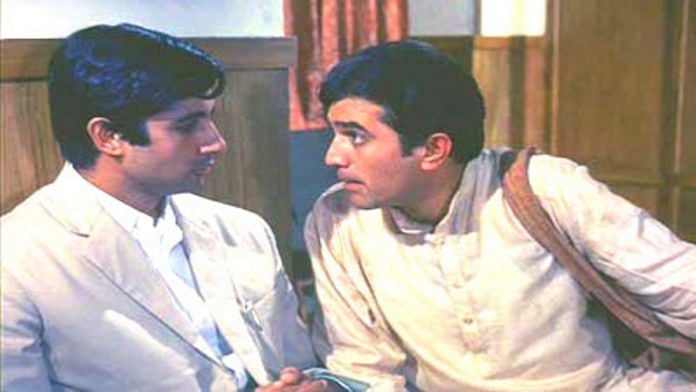New Delhi: If director Hrishikesh Mukherjee had had his way, his 1971 classic Anand would have looked a lot different. One of Bollywood’s first superstars Raj Kapoor would have played the title character, and Bengali star Saumitra Chatterjee would have been Dr Bhaskar Banerjee.
However, this wasn’t to be, and Mukherjee turned to the reigning superstar of the time, Rajesh Khanna, and a budding actor, Amitabh Bachchan, with 12 flops in his kitty.
What followed was a movie that proved a career-defining moment for each of the stalwarts associated with it. Mukherjee behind the camera, Gulzar wielding the pen to craft dialogues as only he can, and Mukesh bringing to life some evocative, timeless lyrics written by Yogesh and Gulzar, to tunes composed by Salil Chowdhary.
While the story was written by Mukherjee, he had help on the screenplay with Gulzar, D.N. Mukherjee and Bimal Dutta.
On screen, Bachchan and Khanna, supported by cameos from a host of fine actors, did their bit to churn out a classic that continues to draw back its army of fans for another viewing (and yet another).
Thursday marks 50 years since Anand was released on 12 March 1971. It was well-received at the box office and went on to become the third-highest grossing film of 1971.
Yet another masterpiece made in Mukherjee’s trademark middle-of-the-road style, the movie is an ode to life itself. Tackling the difficult subject of terminal disease without melodrama, it is not so much a film as a message — “Babumoshay, zindagi badi honi chahiye, lambi nahin (life should be big, not long).”
Also Read: Bawarchi — the Hrishikesh Mukherjee classic that humanised Bollywood’s first superstar
No edge-of-the-seat, please
One of the most famous anecdotes about the movie goes thus: Hrishikesh Mukherjee made it clear to Gulzar that the film should open in a way that audiences know Rajesh Khanna’s character would die. He did not want the viewers to be on the edge of their seats, guessing whether Anand would survive. Instead, he wanted their focus on how, despite having limited time left, Anand wanted to live his life to the fullest.
The protagonist of the movie has cancer and is on the verge of death. However, he resolves to not let his hope flail. “Jab tak zinda hoon, tab tak mara nahin (I am alive until I am dead).”
The film opens with a scene where a book by Dr Bhaskar Banerjee — comprising an extract from his diary — is being launched. The movie then goes into flashback to show how Banerjee, a leading cancer specialist in Mumbai, meets Anand Sehgal. At the time of their meeting, Bhaskar is shown as struggling with feelings of disillusionment, with life and materialism, while Anand is suffering from Lymphosarcoma of the intestines.
A friendship then grows between the two.
The climax of the movie is heartrending. Bhaskar, beside himself with grief, screams at Anand’s body, asking him to speak up. Then, an old recording the two made in the preceding days starts playing.
“Babumoshai!” Anand’s voice streams in from the tape, “Zindagi aur maut uparwaale ke haath mein hai, jahaanpanaah, ise na tum badal sakte ho na main. Hum sab is rangmanch ke kathputliyaan hain (Life and death are in God’s hands. You and I cannot alter it. We are but mere puppets on a stage).”
Also Read: Middle-class cinema’s pioneer Hrishikesh Mukherjee was all about stories with heart
Melodies that are still remembered
Anand is as much a classic for its narrative, as it is for its music, infused with a sense of longing, nostalgia and melancholy. Be it “Zindagi kaisi hai paheli”, filmed on a beach, “Maine tere liye”, or “Kahin door jab din dhal jaaye”, which captures Anand in a rare pensive moment, each song from the movie stays with the viewers long after the movie ends.
By Aradhana (1969), Kishore Kumar had come to be known as the voice of Rajesh Khanna. However, for Anand, music director Salil Chowdhary insisted that Mukesh would be better, since he would add depth to Anand’s character. Once asked what his all-time favourite song was, Khanna had named “Kahin door”.
Anand was a big winner on the awards scene. It won Bachchan and Khanna Filmfare awards for best supporting actor and best actor, respectively, and altogether bagged six of the eight awards it was nominated for. These included best film, story, director, and dialogue.
Mukherjee dedicated the movie to Raj Kapoor, whom he addressed as “Babumoshay”.
Edited by Sunanda Ranjan
Also Read: Hrishikesh Mukherjee’s Majhli Didi is a family drama driven by strong women



